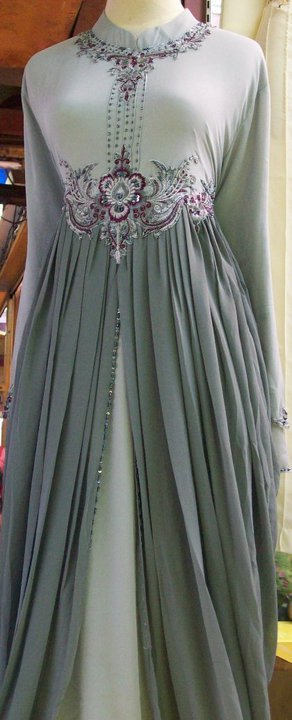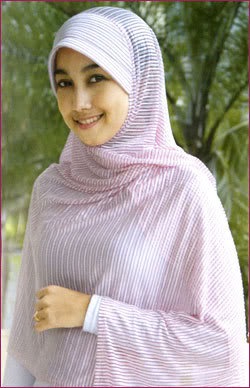About Islamic Dress
Source (google.com.pk)
Literally, the word hijab means "curtain". In the Qur’an the term hijab is not used as a reference to women’s clothing; rather, it was the screen behind which the Muslims were told to address the Prophet’s wives. (The term is also used to describe the "screen" separating God from Moses, as he received divine revelation.) When the Prophet’s wives went out, the screen consisted of a veil over their face. It does not appear that covering the face was adopted by the other Muslim women at the time since it was a special injunction for the Prophet’s wives as is clear in the verses below:
And (as for the Prophet’s wives) when you ask for anything you want (or need), ask them from behind a hijab (screen), that makes for greater purity of your hearts. (33:53)
O wives of the Prophet! You are not like any of the (other) women: If you do fear (God) be not too complaisant of speech, lest one in whose heart is a disease should be moved with desire: but speak with a speech (that is) just. (33:32)
Among Muslims today, hijab refers to the head scarf worn by many women. It is a term used to distinguish between women who cover their hair (muhajabat) and those who do not, even if the rest of their clothes are equally modest.
Finally, the Qur’an also talks about our clothing as something both to cover our nakedness and serve as an adornment, reflecting the beauty of God’s creation. But, as in the verses above, it is behavior and attitude that are most important. Regardless of how we dress, we must have faith and taqwa, God consciousness or righteousness:
O you Children of Adam! We have bestowed libasan (clothing or raiment) on you to cover your nakedness and as a thing of beauty. But the raiment of righteousness (taqwa), that is the best. Such are the signs of God, that they may receive admonition. (7:26)
O Children of Adam! Wear your beautiful apparel (zeenah) at every time and place of prayer: eat and drink: but waste not by excess, for God loves not the wasters. (7:31)
Those are all of the verses in the Qur’an which speak to the issue of dress.
Hadith Text
The hadith also address women’s (and men’s) dress. The most oft-quoted hadith attributed to the Prophet (pbuh) is as follows:
Aisha said, "Asma, daughter of Abu Bakr (that is, Aisha’s sister), entered upon the Apostle of God (pbuh) wearing thin clothes. The Apostle of God turned his attention from her and said, "O Asma, when a woman reaches the age of menstruation, it does not suit her except that she displays parts of her body except this and this," and he pointed to her face and hands. (Sunan Abi Dawud)
This hadith is found only in the hadith collection of Abu Dawud (no. 4095). According to Abu Dawud, it is considered weak because the narrator who transmitted it from Aisha is not known (mursal). Other hadith found elsewhere talk about not wearing see-through clothes or clothing intended for wear by the opposite sex. Also, Aisha reported that when the verse above was revealed about covering the breast (24:31), the women tore their thick outer garments to make veils.
Based on the interpretation and understanding of the above verses and hadith, the scholars (namely, from the major Sunni and Shi’a schools of thought) have determined that hijab (covering from head to toe) is a religious obligation (fard). The notion of ijma’a , or consensus of scholars and or schools of thought, is a well-established component of Islamic jurisprudence from which numerous laws have been derived. Needless to say, determining exactly which scholars and which opinions qualify as "consensus" is not without controversy, a topic that needs expanded discourse among learned Muslims today.
Discussion
Without a doubt, God in His wisdom advises the believers to dress and behave in a way that elevates their status both in this life and the hereafter. Most Muslims do not view modest dress as an imposition meant to oppress either women or men. Indeed, many women who voluntarily wear hijab actually feel liberated; free from society’s rules about women’s looks, free from being slaves to fashion, free to reserve their beauty for their husbands and so on.
A more important question in this discussion is whether individuals, Muslim or non-Muslim, should be forced to dress in a certain way. Every society is entitled to establish minimum standards of dress (in the US, we do have limits as well, defining "indecent exposure" according to this society’s norms). How those standards are enforced and to what extent individuals are punished for violations is of extreme importance in those countries which strongly regulate the dress code.
When reviewing both Qur’an and hadith, there is no precedence for how to deal with such violations; the Prophet (pbuh) or his wives and companions simply reminded others to follow the guidelines. Not a single example of violence, imprisonment, humiliation or coercion can be found during the lifetime of the Prophet (pbuh)that would imply that such practices today are consistent with his example.
The Qur’an does not spell out any punishment (hudud) for violations of a dress code. Also, in the verses outlined above, the Qur’an clearly addresses "the believing women" meaning Muslims, so that it is difficult to find an argument to justify the imposition of an "Islamic" dress code on non-Muslim women. Thus, by inference the decision to dress a certain way is left to the individual who will face the consequences for all actions in this life, to her benefit or detriment, as God sees fit.
The Qur’an also says "There is no compulsion in religion" (2:256). Those who choose to behave a certain way as a reflection of their belief in God and His message and thus accept the challenges therein are not the same as those who behave to satisfy other people or laws set in place. The freedom and ability to choose to do good make the reward that much greater.
Among many Muslims today, hijab is often equated with piety, both by those who cover their hair and those who do not. Unfortunately, too many assume that a woman who covers must naturally be more religious or conservative that one who does not. This generates expectations and pressure on Muslim women in hijab , whose behavior is held to different standards, perhaps undesired on the part of the woman. On the other hand, according to popular opinion, the Muslim woman who does not cover her hair (even if she is otherwise dressed modestly) has not quite arrived at the perceived goal of all righteous believing women. The scarf, an article of clothing, has sadly become a litmus test for a Muslim woman’s faith and devotion to God. Indeed, the importance which some Muslims have attached to hijab has made some sarcastically refer to it as the "Sixth Pillar" of Islam, on par with prayer, fasting, alms-giving, pilgrimage and bearing witness to the oneness of God.
While our faith is manifested in our deeds, only God can judge our piety and righteousness. The Prophet himself (pbuh) would not venture to say who, for certain, would reach Paradise. Such knowledge is with God alone such that the judgement of one person regarding another’s religiosity is totally irrelevant.
How Muslims dress is only one aspect of our identities. For many women, dressing conservatively and covering one’s hair are felt to be acts of faith. Therefore, discriminating against a woman for dressing a particular way violates her freedom to practice her religion, a fundamental right cherished here in the United States. The non-Muslim community, particularly the media, needs to get beyond its own narrow one-dimensional view of the conservative dress of the Muslim woman as a sign of oppression. It is a choice that American Muslim women make, perhaps not the same as that of other women, but equally valid. Ultimately, what really matters is the attitude, behavior and demeanor of the person in question.
A Source of Division?
Among Muslims, the division and intolerance expressed regarding women’s dress is one factor that impedes our growth and development as a meaningful presence in the world today. All Muslims struggle with matters of faith, identity, and community. With the pressing issues facing the Ummah today such as poverty, illiteracy, violence, warfare and other ills, we must ask ourselves if we want to be consumed and paralyzed by the issue of women’s dress. Placing the burden primarily on women without calling for the accountability of men to control themselves and their sexual appetites is in violation of the spirit of the Qur’an which is about self-control and self-restraint.
In addition, the extremely negative attitudes which consider women who do not cover as somehow unchaste are most egregious and unjustifiable. Wrongful accusations against a woman’s honor are met unequivocally with severe consequences as mentioned in the Qur’an (24:4-20).
Only together, through cooperation, tolerance and forbearance, as exemplified by the Prophet (pbuh) can Muslims overcome the obstacles to success in this life and the hereafter that often are expressed in our attitudes towards women.
Islamic Dress Abaya Designs 2014 Dress Collection Dubai Styles Fashion Pics Photos Images Wallpapers

Islamic Dress Abaya Designs 2014 Dress Collection Dubai Styles Fashion Pics Photos Images Wallpapers

Islamic Dress Abaya Designs 2014 Dress Collection Dubai Styles Fashion Pics Photos Images Wallpapers

Islamic Dress Abaya Designs 2014 Dress Collection Dubai Styles Fashion Pics Photos Images Wallpapers

Islamic Dress Abaya Designs 2014 Dress Collection Dubai Styles Fashion Pics Photos Images Wallpapers

Islamic Dress Abaya Designs 2014 Dress Collection Dubai Styles Fashion Pics Photos Images Wallpapers

Islamic Dress Abaya Designs 2014 Dress Collection Dubai Styles Fashion Pics Photos Images Wallpapers

Islamic Dress Abaya Designs 2014 Dress Collection Dubai Styles Fashion Pics Photos Images Wallpapers

Islamic Dress Abaya Designs 2014 Dress Collection Dubai Styles Fashion Pics Photos Images Wallpapers

Islamic Dress Abaya Designs 2014 Dress Collection Dubai Styles Fashion Pics Photos Images Wallpapers

Islamic Dress Abaya Designs 2014 Dress Collection Dubai Styles Fashion Pics Photos Images Wallpapers

Islamic Dress Abaya Designs 2014 Dress Collection Dubai Styles Fashion Pics Photos Images Wallpapers

Islamic Dress Abaya Designs 2014 Dress Collection Dubai Styles Fashion Pics Photos Images Wallpapers

Islamic Dress Abaya Designs 2014 Dress Collection Dubai Styles Fashion Pics Photos Images Wallpapers

Islamic Dress Abaya Designs 2014 Dress Collection Dubai Styles Fashion Pics Photos Images Wallpapers

Islamic Dress Abaya Designs 2014 Dress Collection Dubai Styles Fashion Pics Photos Images Wallpapers

Islamic Dress Abaya Designs 2014 Dress Collection Dubai Styles Fashion Pics Photos Images Wallpapers

Islamic Dress Abaya Designs 2014 Dress Collection Dubai Styles Fashion Pics Photos Images Wallpapers

Islamic Dress Abaya Designs 2014 Dress Collection Dubai Styles Fashion Pics Photos Images Wallpapers

Islamic Dress Abaya Designs 2014 Dress Collection Dubai Styles Fashion Pics Photos Images Wallpapers

Islamic Dress Abaya Designs 2014 Dress Collection Dubai Styles Fashion Pics Photos Images Wallpapers

Islamic Dress Abaya Designs 2014 Dress Collection Dubai Styles Fashion Pics Photos Images Wallpapers

Wow what a great blog, i really enjoyed reading this, good luck in your work. Islamic Dress UK
ReplyDeleteHello, an amazing Information dude. Thanks for sharing this nice information with us. How to download linkedin connections into excel
ReplyDelete